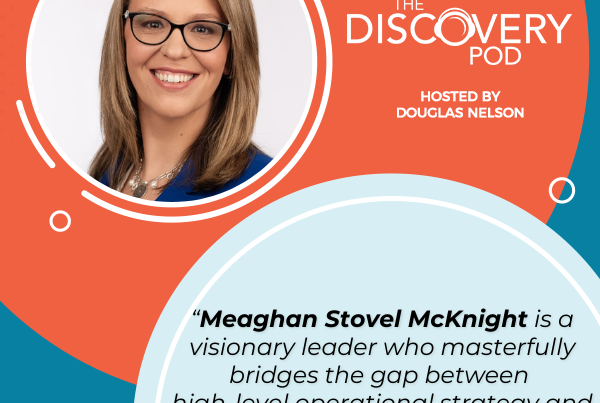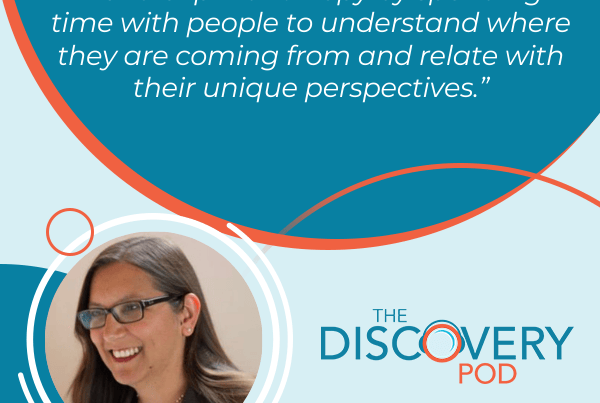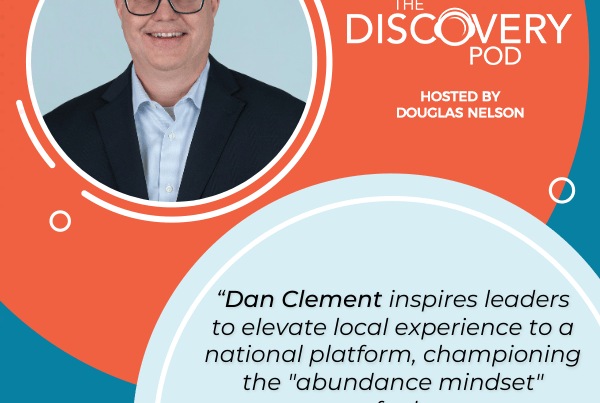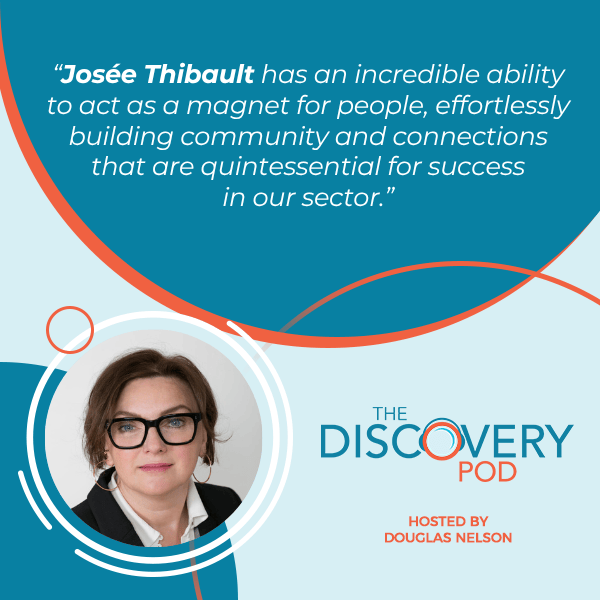
Explore the true meaning of innovation and its role in building meaningful partnerships and telling compelling stories within the social profit sector. Joined by Josée Thibault, Practice Lead for Philanthropy and Social Innovation at The Discovery Group, this conversation dives deep into navigating uncertainty at the board table, fostering genuine collaboration, and crafting a narrative that embraces purpose, theory of change, and donor engagement simultaneously. Discover strategies for driving progress with those willing to move forward, and learn how to leverage your organization’s unique assets to create lasting impact.
—
Listen to the podcast here
What’s Shaping The Future Now With Josée Thibault, Practice Lead, Philanthropy & Social Innovation
Welcome to the show. On our episode, I’m joined by one of my own colleagues, Josée Thibault, practice lead for philanthropy and social innovation here at The Discovery Group. She and I go deep on the concept of what does innovation really means anyway. What’s the role of uncertainty, and has it come up around your board table in the last number of months?
Josée shares her perspective on building meaningful and true partnerships, what the role of collaboration and convening actually means, and telling a compelling story that makes room for your purpose, your theory of change, and your donors all at the same time. This is an episode that you won’t want to miss. It deals with all the issues that are hot around leadership tables and boardroom tables all across our social profit sector. Thank you for tuning in to the show.
—
Welcome to the show, Josée.
It’s an honor to be here.
Building Community From Scratch
I’m looking forward to a very wide-ranging conversation, but for our readers who don’t know who you are, may not be familiar with your background, could you share a bit about your background and how you show up in your work?
I am employed at The Discovery Group. I am the practice lead of Philanthropy and Social Innovation with The Discovery Group. I work with clients on fundraising strategy, governance planning. I’m also a bit of the social innovation piece that comes in. I’m the self-appointed boundary spanner for TDG. There’s such a richness of experiences, of the leadership, of innovation in the sector generally, but also here in Toronto, where I live.
I like to know what’s going on and bring it back to the group, either as information or even sometimes as productive patients. I’ve worked in the for-profit sector and the nonprofit sector in big shops and little shops. I’ve worked in spaces like UBC, but also in smaller organizations where it was a one and a half staff. I’ve also worked in more entrepreneurial spaces. From a personal perspective, Doug, I’m Acadian.
I’m from Northern New Brunswick. I come from a very working-class background. I’ve worked part-time since I was fourteen. My dad didn’t graduate from high school. My mom graduated just a few months before me, which was a huge point of pride. I was the first person to go to university. Others who have had that experience will understand that there’s so much you don’t know when you have to learn it super fast and just acclimate to new environments. Also lived in many places.
Some of it, Wanderlust, and some of it because of my spouse’s work, but I’ve lived in a Ganesh and Halifax and Calgary and Edmonton and Chicago, Seattle, Whitehorse, Vancouver, and now Toronto. I like to think that I know my country, but also through those experiences, a really deep love and appreciation for community. Every place has a different set of values and approaches, and I’ve learned a lot from that. Also, having started from scratch many times over. It feels very rewarding to me when I can serve as a connector for people socially, professionally. I worked hard at that. If my tombstone says, “Josée Thibault wrote great intro emails,” I will feel like that is a life-weller.
I think you do a lot more than that.
I try.
Over the last year, having the chance to be in a lot of rooms with you and meeting people who are new to me, I’ve seen time and again you come into a space and act as a magnet for people who want to come and say hello, who have a connection with you, who drawn to you in the community that you’ve created just in that room for that day, but of course, spanning well beyond that room and the relationships that you’ve started before. That is the quintessential skill of someone who’s very successful in our sector, whether it’s an executive leader, as a fundraiser, or both. How has that starting from scratch and building community shown up in your professional life?
I’m very curious. I like to think that I am adaptable. There’s just a foundation of skills that many of us have that if you just let yourself have the confidence that you can apply them anywhere, that did they will transfer well, like genuinely transferable skills are indeed transferable. While I don’t have a tech background, I worked for a tech innovation hub and I figured out the math, but being able to really relate with people, being genuinely curious about what people care about, what they want to do and how you might be able to be a part of it, I think that just transcends borders, sectors, and just is there halfway to building relationships. That’s what matters in the end.
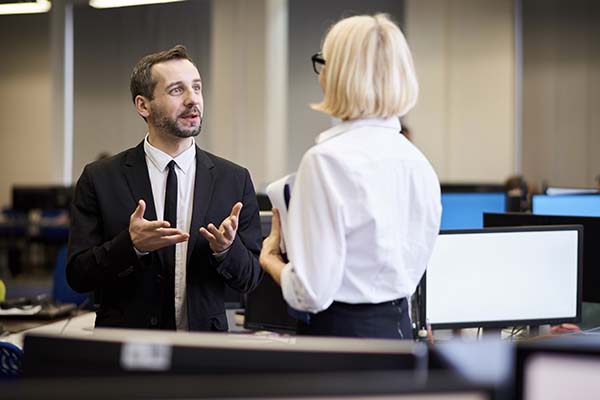
Social Innovation: Being able to relate with people and being genuinely curious about what they care about and want to do and how you might be able to be a part of it, transcends borders and sectors. It is halfway to building relationships.
Many of our clients in Toronto or here in Vancouver, across the country, are often taking on that challenge of loneliness and isolation that’s happening across the country that we’re seeing reports of by community foundations across Canada. Much of the success of our sector is when we can come together in a podcast like this of conversations with social profit leaders, convening around conferences, which many of us have been doing over the last couple of months, but also creating that sense of community within organizations that helps people align around purpose.
I had the chance firsthand to see you do that when you were at MaRS in terms of rallying the community there around the potential of philanthropy in the organization. It was a potential that you saw and some others saw as a glimmer, but not everyone was awake to. Tell us a little bit about that experience of crafting a philanthropy program in a space where not everyone was even sure the organization was a charity.
It was definitely a challenge and a wonderful opportunity. I think wherever you are, you will always have folks who are ready and excited, and you have folks who just need a little bit more context, a little bit more time, a little bit more understanding. There are folks for whom this is just not the right time. You see it even with donor relationships. It’s not yet. I’m always really curious to go, “What’s the first step? What’s the thing that we can do together that will feel good? What’s the thing that we can do together that will advance things a little bit more and might open the door a little bit of a crack open?”
You take those wins and you celebrate those wins and you’re proud of those wins, and then you build on those wins. I think the minute you go, this is hopeless. These aren’t the right people, or these people don’t want to work with me, or this is not the right place or the right time. I think you’ve already lost. I think there’s always room for incremental folks.
The minute you go, this is hopeless, you’ve already lost. Share on XThe origin of the phrase is somewhat problematic, but the concept of a coalition of the willing, I think, goes a long way both in the example you’re sharing, but so many of our clients are seeing that. Let’s work with the people who are willing to move with us now to demonstrate that progress can be achieved, and then circle back and collect others who want to be a little bit late to the party, or for whatever reason, they are late to the party.
That’s it. There’s always room. I’m all about the Ben Wagon. Ben Wagon’s huge. There are all kinds of rooms.
The Power Of Strategic Partnerships
The creation of community and moving forward with those willing to move forward with you speaks a lot to the evolution of partnerships, which is something that we hear a lot from our clients. We hear a lot from the boards that we’re in front of here at The Discovery Group. Social profit sector organizations sometimes have a tendency to view relationships as one-dimensional, that grantor to grantee or donor to organization, or to be so focused on their own mission that they work in isolation. What do you see as the role of partnerships in our sector?
It’s just one of the things that I’m most excited about and that I see so much potential in. You and I, were just recently at the launch of the Greater Purpose, which is a community of purpose-driven leaders in the corporate sector. It’s so exciting to see that momentum in the corporate sector for people who are really looking at a more than money approach. We want to grant, we want to support, we want to give back, but who also want to share their talent and their network and who want to align their products and their services to social impact.
There’s just this wellspring of energy that folks want to give and especially by the time when maybe funding might be contracting a bit or there’s definitely a bit less out there for organizations that work in systems change. Government funding might be reorienting in different ways. Folks might feel a bit of a squeeze, but the needs never change. We also know that diversity of representation and opinion, all of those things are critical. There’s a lot of ground to cover.
I think that the best way to do that is through partnerships, and just more strategic and deeper partnerships. That can be organization to organization. It can be umbrella organizations and intermediaries that provide backbone support. You see so many of them, and it’s everything from funding partnerships, but also advocacy or programming when you think of the set seas of the world. I know you interviewed Victor in the past, New Power Labs, CanadaHelps, and Tamarack.
There are so many folks who are doing just meaningful, genuine collaboration and partnership. Of course, cross-sectoral with the government and a purpose-driven company. There’s just so much opportunity there to really deepen your work and to have greater reach. To me, it’s about having the curiosity, but also a little bit of humility, and then finding shared passion to explore what you might want to build with someone.

Social Innovation: There’s so much opportunity to really deepen your work and to have greater reach. It’s about having curiosity, but also a little bit of humility, and then finding a shared passion to explore what you might want to build with someone.
It’s about collaboration, but also about co-creation and rolling up your sleeves. I worked on a youth employment project a few years ago called Opportunity for All Youth, and we had corporate partners, and they funded that there was some money, but really, it was about so much more than that. You had them at the table, and they go, “Great.”
You’re also going to hire the youth. You’re also going to give them a living wage. Obviously, we’re going to sit together and we’re going to work on your recruitment process and see how we can break down those barriers. The value of the relationship was much more than the dollars. I think when you think about your theory of change. I think it’s really about having your theory of change on lock.
What is it that you want to do, and having an expansive view of your assets? That includes your reputation, the goodwill you have in the community, your network, and your special programming. You can look out and see who can I work with to either fill the gaps or to really amplify or deepen the work that I’m doing. I think some of it we’ll do because we have to, but I think the really good work is going to be because we want to. I think there’s nothing but opportunity in that space.
I think you’re absolutely right. I just want to give a quick shout-out to a friend of the podcast, Brad Hoffman, and his colleagues at the Greater Purpose had their very effective launch. It’s great to see these new innovations coming into our space, the opportunity to bring corporate and social profit organizations together in a new way.
Josée, in your description of what partnerships are, I was thinking of a couple of truisms that I found to be in partnerships. It can be very difficult to partner with very large organizations, and especially two large organizations partnering with one another can be especially challenging. Often, it’s because the larger organizations are very rarely aware of how hard they are to partner with.
They come to the table with the assumption, we can partner as long as we follow our processes, our rules, and measure our success by our outcomes. Sometimes it’s funders doing that, corporate funders doing that. More often, it’s what’s usually universities in our sector that can be the most challenging to partner with. What advice would you have for leaders in organizations that are looking for some of these big society-wide large partnerships that they want to build to advance their purpose, but are struggling to find their way into the dance?
I think in part, it goes back to, I might repeat the answer that I gave earlier, which is to look for the small wins. I think when you have folks who really genuinely want to work together or want to explore, if you are the leader of one such organization, just carving out a little bit of space, giving people just a little bit of room to stretch out a bit and just explore and just see what happens. My innovation is really just about trying to do things in a new way. If you can create a little bit of space for people to explore, and then if it gets so big that my goodness, we absolutely need to add governance around this piece, it is just so successful.
Carve out a little bit of space, giving people room to stretch out a bit and just explore and see what happens. Share on XWhat a great problem to have. I think the more you can carve out room and give people agency to explore and to see what can be done, you don’t have to come in as a full organization and the weight of your entire organization. Sometimes, if you give just a little bit of space for people to play and give them a bit of a sandbox, and you give them the support that they need, but you break down those rules a little bit in a container that is appropriate and that you can manage.
Mastering The Art Of Convening
I appreciate what you’re saying there about get a little bit of space. There is such a power that social profit organizations have from community foundations to research foundations to grassroots social service organizations to bring people together. That power of convening is something that I think is vastly underestimated in our sector and by leaders in our sector.
We have a social credibility to bring people together from all different sectors in a way that government doesn’t, certainly in a way that corporate Canada doesn’t, to say, “Here’s an issue, here’s a challenge, here’s an opportunity. We want to bring some bright thinking, new ideas, that the innovative concept of innovation is just a new way of doing things.” We want to bring as many of those ideas to the table as possible. What have you seen that’s been particularly successful for organizations playing that convening role?
One of the things that I think is really lacking in our sector, and it’s exciting when conveners do it well, is that there are a lot of new ideas and new initiatives. I’m thinking particularly in terms of blended finance, but I’m also thinking of AI and all of these really big picture topics. People are always looking for their way in. How do we do that? What does it mean exactly? Like how, what’s the path?
What’s step 1, step 2, step 3? I think really effective conveners give space, one, for people to articulate those questions in a safe space where people can really explore and engage together, but also creating use cases so that people can genuinely go, “This organization over here has tried it and has done it and it looked like this.
I can take this piece of that solution and move it forward in my organization, but this part here, I’ll have to play around with it a little bit to make it work on my end.” I think effective conveners create space for people to share challenges and to genuinely workshop ideas together, but then really sharing successes and how-tos so that you can learn from them.
I think if you’ve solved a problem, by all means, please don’t keep it to yourself. Position yourself as look, national’s leadership that celebrates the staff that have worked on that solution, even if it’s just a small solution, it can have an impact. Share it. Let people know about it so we can all learn from it. Call me, I want to know.
If you've solved a problem, by all means, please don't keep it to yourself. Even if it's just a small solution, it can have an impact. Share on XIf you’ve the answer, don’t keep it to yourself. Again, having just been through a bit of a whirlwind of conferences, I didn’t hear a lot of people keeping the answers to themselves. There was a real
willingness to share. I think some willingness to very optimistically interpret early results as the ultimate solution, but people are willing to share.
I appreciate the distinction you’re making in that definition of convening, that the ability for people to have access to the conversation. Is this something that is meaningful for us? Is this something that’s appropriate for us? Let’s ask some of the basic questions, and then, how do we get started?
Again, I just come back to the incredible power that our sector has to act as a convener when we do so in thoughtful ways that aren’t a step away from a transaction of, so now support us but to go with that genuine curiosity you’ve referenced a few times goes a long way, and great things can happen from it.
Readers will have read, Christy Holtby and I recorded a live podcast, The Partnership Conference in Calgary, focusing on the Alberta Cancer Foundation, which convened a partnership between private industry, the provincial government, and their foundation. At the outset, the foundation wasn’t even a part of the transaction that ultimately came.
As the partnership evolved, they certainly came into that with some really significant investments. The goal was to just get some people talking that needed to have a different conversation than they’d had before. The foundation was leveraging its credibility and its positioning to be able to make sure that the conversation that happened resulted in a partnership that will see more than a billion dollars invested in medical infrastructure and research in the province over the course of the next eight years.
A really powerful role that the Alberta Cancer Foundation played. It wasn’t the Alberta Cancer Foundation going out and seeking partnerships to fund its mandate or to fund its programs. It was looking for a new way to connect different partners to the work that they do. There are some really inspiring examples out there that people can learn from, and encourage you to ask questions of people that are doing it right. I just shared one example, Josée, but can you think of an example of this concept of partnerships is working really well for an organization?
I really have to give a shout-out to CILAR, which is just a remarkable network coalition of innovation leaders, quite literally, advancing respect. It’s really remarkable how they’ve assembled a cohort of leaders who are genuinely committed to advancing respect in the corporate sector, but in society in general, who also are working very deliberately with very specific organizations, social profit organizations that can help advance the work. They do so. It’s funny, I was just at an event of theirs this morning and they were talking about how we as business leaders are not going to get used to come to a terrific hiring event.
You’ve got to partner with folks who are deeply embedded in the communities that you aim to reach and serve. The ones that have credibility and that can truly lend some of their credibility over to you in a genuine way, so that you can advance the work together. To me, that is just such a beautiful example of the business sector collaborating with the social profit sector on very specific, actionable, tangible initiatives, and all hands on deck. There’s no one there for show. Everyone is there to do the work, and that’s really inspiring.
Crafting A Compelling Narrative
I think CILAR is a great example of a lot of positive things. One of them is the way they tell the story. A lot of our work focuses on building a compelling case for support for our clients. Sometimes they call it a philanthropic value proposition. Sometimes those cases write themselves, and it’s very obvious for the organizations.
Sometimes there are challenges because the work that the organizations are doing is very nuanced, or it’s very complicated, or it’s contingent on the work of other organizations or levels of government. It can be harder to tell that story to a prospective donor in a way that is simple to get into a bite-sized morsel for donors. What have you found that works in those situations where the storytelling is a bit more complicated?
I’ve been inspired by a lot of what’s happening in climate, which, as you know, we’ve seen significant investment. The climate philanthropy pledge is just going from one major announcement to the other. It’s desperately needed, but it’s exciting. We grappled with this a little bit at MaRS because you’re working with meaty social systemic issues that you’re trying to grapple. You’re not necessarily up and put food on someone’s table.
You’re looking at things from a systems perspective. It’s just a little bit. There are a few more dots to connect before you can make something compelling that people can wrap their arms around. I’m seeing a real shift away from talking about what are really significant, like genuinely complex problems, but not talking about them as intractable or dire. You have to find the points of light. You have to be realistic. You also need to be hopeful.
I call it clear right optimism. You just have to be able to talk about the solutions that are genuine and that people can start to feel hopeful about. No one is investing in it since this is Boulder. That’s not where the money’s going. There’s just no inspiration in that. It doesn’t feel like you can really have an impact, but you do find inspiration in the individual.
Who’s managed to find grace or find a solution, or that cool climate solution that’s having a real impact? I was listening to your interview with Rick at the Canadian Climate Institute, and I’m excited about heat pumps. That’s really cool and exciting. Those are the small little solutions that you can talk about that are genuinely meaningful and impactful.
I’m starting to see it a little bit, too. I don’t know if you are, Doug, but with youth mental health or addiction, these are legit challenges, and it’s not about glossing over the magnitude of it, but it’s really about finding those way in so that people can truly feel like they’re having a meaningful impact. They are. It’s just finding a way to talk about it.
I think the other consideration in all of that, organizations want to tell their story about the work that they do and why they do it, and what their impact community or towards a purpose are. What I see a lot of organizations leaving out or leaving the important part quiet is the role of philanthropy. What are we asking our donors? In our theory of change, here’s the intervention.
Here is the process for executing on that intervention. Here is the outcome that we anticipated we seek, and here’s how we’re going to get there. The next question is, and here’s the role of philanthropy. It’s not just the dollars to do what we said we’re going to do. That’s part of it. There needs to be a meaningful role for philanthropy, not about making the donor the hero of the story, instead, it’s about showing that problems like youth mental health or climate change can feel insurmountable or even inaccessible.
What can one family do? What can one donor do? The value is giving those donors a tangible thing they can do. When you make your gift of $10,000, $100,000, a million, or $10, here’s what happens next. The work that I know you’ve done with a number of clients already, and we do right across the board here at The Discovery Group, is putting that emphasis on what the role is that you’re asking your donors to play. It’s not enough to identify the problems.
It’s not about raising awareness. A case for support or a value proposition has nothing to do with raising awareness about your organization or your purpose. It needs to be about what is the role of philanthropy in creating positive change in the community. The extent to which organizations can do that in youth and mental health, we know, Take a Hike Foundation is a tremendous example of doing that successfully.
There are lots of positive examples, but as you say, it’s not enough to ring the bell and say something bad has happened or the sky is falling. It is, and here’s what we’re asking you to do about it, and here’s what will happen when you say yes. The organizations that are able to connect those pieces are raising more and more money every year from more and more donors. They really are bucking that trend of fewer donors and lower donations across the board. There are certainly ways around trends in our sector. Being clear about the role that philanthropy plays in your storytelling, I think, is chief among them.
I absolutely agree. It’s definitely about articulating the role of philanthropy. It’s also about articulating the role of each particular individual donor. You can be sure that a potential donor, if you’re approaching someone about a gift to fight climate change or even youth mental health, you can be sure that aside from trying to make a wise investment, that person is also genuinely concerned about climate change or youth’s mental health. They genuinely want to be part of the solution.

Social Innovation: It’s definitely about articulating the role of philanthropy. It’s also about articulating the role of each particular individual donor.
Though granted, a financial contribution might be the most effective way that they can do that. It’s not necessarily the only way. I think the more you, again, look at it from a partnership perspective or that you see the person that you’re talking to as someone who genuinely cares about the same things that you care about particularly for very complex issues, and seeing them as potential partners and collaborators is a really interesting way to approach a problem.
Tell your story, make sure there’s room for those that you serve. In that story, make sure there is room for those that are funding you in that story. The combination of those three things is going to make a big difference in terms of your fundraising and in terms of how well you’re able to communicate the role of your organization in the community.
It’s not necessarily about the donor driving the bus or any of those things that organizations sometimes are worried about, and sometimes they’re rightfully so. It’s about when you’re genuinely trying to build a coalition of supporters or when you’re genuinely trying to tackle the problem that you’re not 100% sure how to solve, talking to folks from that position of curiosity, I think, can really have great results.
My entire career, now, many decades, several decades long at this point, I had a very small handful of donors who really wanted to drive that bus that you referenced there. I often see, particularly in our work here at The Discovery Group, organizations that put themselves in a difficult place because they offer the keys and the seat behind the wheel to the donor. We can be who you want us to be. We can do what you want us to do.
Often donors are feeling like, “Shouldn’t you know you’re the expert? Shouldn’t you know?” Sometimes donors will be like, “If they don’t know, I’d better help them.” They jump in and they start driving the bus. Time and again, it’s organizations that put themselves in that issue. It’s not the dynamic. It’s not the narrative of the donor capital controlling the social profit organization. 99 times out of 100, the organization has abdicated responsibility in its conversations with donors.
Much of our work, and I know you’ve been involved in a few of those conversations in the last couple of months. It’s about getting the organizations back, driving the bus. The ones that are driving their own bus are raising a lot more money, have better relationships with donors, stewardship is much more straightforward, and that alignment with their board is pretty coherent because donors are funding the things the board expects the organization to be doing.
This is an area you’ve touched on. It’s a bit of a button for me because I think it’s an own goal situation for a lot of organizations is scoring a goal on themselves because they’re not owning their story. They’re not owning that account. It starts with, as you said, making sure there’s a role for the donor, make sure there’s a role for an individual donor in your story. Yes, but they’re not the protagonist in your story.
That’s it.
They are an actor in that story, along with you and many others.
It’s really having confidence in your theory of change and the way that you’re doing things, and being aware of what you bring to the table, the assets that you have, and going with that confidence.
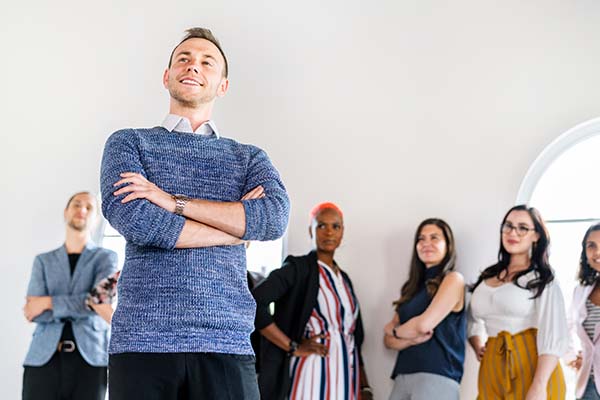
Social Innovation: It’s really having confidence in your theory of change and the way that you’re doing things, and being aware of what you bring to the table, the assets that you have, and going with that confidence.
Navigating Uncertainty In Leadership
Focus on owning it, not scoring on your own net, I think, is a good reminder for folks. Everybody knows it when you say it like that, but again, don’t abdicate that control over the narrative. Don’t offer donors the opportunity to change your theory of change if you’re committed to it. If you’re not committed to it, don’t try to raise money for it.
That’s it.
I get going on that one in particular. One of the things we’ve seen a lot happening in our sector over the course, a lot of uncertainty about what’s going to happen, both economically and politically, and I’ve had different provincial and federal elections. Occasionally, there’s a headline from down south about what’s happening there and how that might impact us here in Canada. What are you hearing from leaders about how they’re managing this uncertainty in our economy and in our world?
I think it’s really hard. I think in the end, you have to really just be clear in your values, and again, your commitment and your mission, and having flexibility. It’s not about having all the answers. You’re not going to have all the answers because the answers change all the time. Sometimes as you’re speaking, it felt like in the last little while, but just having being able to articulate for yourself and for your team, a clear sense of the general direction in which you’re going in the confidence in that direction and the willingness to ride those waves, I think is really important.
We’ve seen a lot of organizations or a lot of boards with more than CEO and senior leaders in organizations. We’re saying, “What’s going to happen?” I don’t know about you, but when I was enrolled as a CEO, no one gave me a crystal ball. They didn’t have one of those, and none of our clients have yet shared access to their crystal balls in terms of what’s going to happen.
What we’ve been saying a lot to folks is to focus on what you will do, the questions you’re going to ask, and the scenarios you’re going to trial. If A, then B, if B, then C, and play that out so people know that you are in control of your reaction to the situation. Even if we’re not fully in control, as many of us, or as none of us are, we’re not fully in control of what’s happening in the world, but we are in control of our own actions.
I talk about this with my kids all the time. Control what you can control and let the rest be. Like you cannot obsess over it. You just need to keep your eyes wide open, but where you have agency, take it.
Control what you can control and let the rest be. Share on XOwn it. Josée, you’ve been with The Discovery Group now for about 8 or 9 months. I think things are going pretty well. Let’s not do a performance or a 360 review on this podcast. I’m curious what your observations are of having been enrolled, been a leader there at MaRS, then coming across the street to working in the consulting space. How do you see the sector differently, or do you?
I am constantly amazed at the richness of the sector. I mean that in terms of just the passion of the people who work in the sector, the types of solutions that people are bringing to genuinely complex problems, that the doggedness, the persistence that people bring to the sector is just really inspiring. I’ve loved working with a variety of different organizations in different sectors, working on different types of problems. There’s that consistency of folks just being so passionate about what they do. It’s been a really rewarding and meaningful experience. You can put that in my performance review if you’d like. It’s genuine. It’s been fun.
The Future Of Social Impact
With that said, Josée, what are you looking forward to?
I’m really excited about this nation-building mood that we seem to be engaging in. It’s a little bit of buy Canadian, it’s a little bit of like ditch your passport and spend your vacation at home. I think it’s all about a little bit more than that. I think there’s genuine passion and commitment in just regular people wanting to invest in their own communities in a variety of different ways. I think people are feeling, they’re feeling Canadian and they’re feeling how they’re special, how we’re different, and what makes us.
This is a call to people who are listening, and if you’re seeing it too, or if you’re capitalizing on it in a lovely way, I’d love to hear about it. I’m just seeing so much opportunity in terms of talking about the work that you do in a way that builds stronger, more resilient communities and engaging with volunteers and folks who want to be a part of it. I think it’s a little moment in time that I hope extends not just in government and in the corporate sector, but it’s about more than shopping. It’s about building really strong, vibrant communities that take care of each other. I think there’s room for all of us in that. I’m excited about that.
There is space now to dream big dreams, to tell big stories, big ambitions. It’s great having you as a part of The Discovery Group, being able to help our clients realize those big dreams and tell those big stories. It’s been great having you on The Discovery pod.
I love the conversation, and it’s a privilege to be here.

